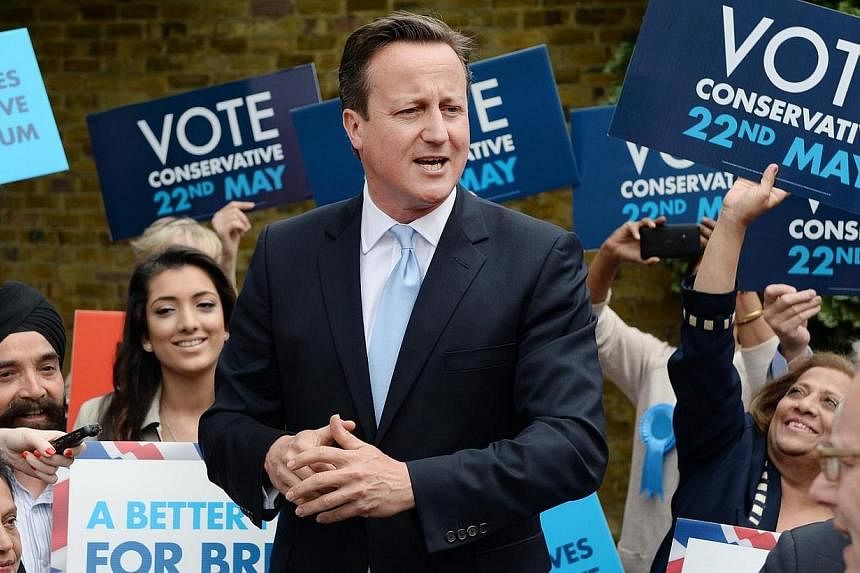BRUSSELS/LONDON (REUTERS) - British Prime Minister David Cameron will launch an assault against "business as usual" at a summit in Brussels on Tuesday, calling on fellow EU leaders to set simpler priorities that meet the concerns of frustrated voters.
After resounding victories for the far-right in Britain, France and Denmark, and a strong performance by populist or Eurosceptic groups in many other EU countries in European elections, Mr Cameron is under pressure to shore up his position at home and deliver on long-promised changes in Europe.
In a series of phone calls in recent days, he has spoken to six EU leaders including German Chancellor Angela Merkel and Swedish Prime Minister Fredrik Reinfeldt.
He made further calls on Tuesday, one of them to Dutch Prime Minister Mark Rutte. "Fellow leaders have agreed that it is an important moment for the European Council to set out its views on the future of the EU and provide clear direction of what is expected from the next European Commission," Mr Cameron's spokesman said.
Mr Cameron alienated his peers in 2011 by wielding Britain's veto over treaty change at the height of the euro zone crisis. They simply navigated around him. He may find allies this time.
After an electoral drubbing, French President Francois Hollande said on Monday he would press for change within an EU which had become remote from its citizens and Italian premier Matteo Renzi, possibly the biggest winner in weekend EU elections, is intent on pushing a pro-growth agenda.
One of Mr Cameron's immediate objectives is convincing other leaders that Jean-Claude Juncker, the former prime minister of Luxembourg, is not the right person to lead the European Commission, with its sweeping legislative powers.
Mr Juncker, a long-time advocate of a more federal Europe, has been chosen by the EU's main centre-right political group, the European People's Party, to be their candidate for Commission President, arguably Brussels' most powerful job.
With the EPP having won the most votes, clinching 213 seats in the 751-seat European Parliament, Mr Juncker is in pole position to secure the post, a point he firmly underlined on Monday.
But Mr Cameron has concerns that Mr Juncker, prime minister of Luxembourg for 19 years and at the heart of European politics for decades, is too old-school to promote dynamic change, EU officials say.
Mr Nigel Farage, leader of the anti-EU UKIP party and winner of the EU elections in Britain, is pressuring Mr Cameron to harden his positions on Europe and said Juncker was unacceptable. "He is a raving federalist," he told reporters as he arrived at the European Parliament. "There is nobody more fanatical about building a United States of Europe. His candidacy is there on the table just at the moment, but the European electorates have made it clear they are going in the wrong direction."
As always, Germany's Angela Merkel will be the most important voice. She has backed Mr Juncker's candidacy, though not unequivocally, and declared on Monday that a new focus on competitiveness, growth and jobs was needed to win back voters.
LONG PROCESS
While Mr Cameron has been relatively outspoken about his reservations he is not alone with some northern and east European leaders sharing his concerns, officials say.
Tuesday's summit will not include any detailed discussion of specific candidates for the presidency, with leaders instead talking broadly about the characteristics and skills required for the coming years.
With the EU having to tackle big questions about further integration, how to balance the relationship between the 18 countries that share the euro and the 10 that are outside and future energy security, appointing the right Commission president is critical.
Under the Lisbon Treaty, leaders are responsible for nominating a candidate "taking into account" the elections to the European Parliament. Whoever they nominate must then be approved by a simple majority in parliament.
The process is likely to unfold slowly over the coming weeks or months but Tuesday's summit - the first opportunity for all 28 leaders to assess the political shifts caused by the elections - will be important in establishing where allegiances lie.
"It will be too early to decide about names," European Council President Herman Van Rompuy, who chairs summits of EU leaders, made clear in a letter sent to them last week.
"We will talk about the process leading to the European Council proposing a candidate for the future presidency of the Commission ... and how to organise our work over the coming weeks."
While Mr Cameron may have deep reservations about Mr Juncker, he and others may not be able to block him.
According to EU rules, the nominee must be approved by a'qualified majority' in the European Council. What that means in practice is that if Germany, France and most other member states supported a candidate, Britain would struggle to block it.
At the same time, Germany and others may not want to push Cameron to the edge.
With Britain's relationship with the EU in turmoil and Mr Cameron having promised a referendum on continuing EU membership before the end of 2017, leaders such as Mrs Merkel are keen to do what they can to convince Britain to stay in the club.

